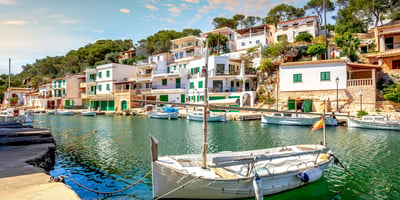Recent headlines have raised concerns among potential overseas buyers about Spain’s property market. There have been reports of a 100% property tax proposal, a ban on non-EU, non-Spanish residents purchasing property, a three-year tourist ban and new evidence requirements for visitors. We get to the bottom of these sensationalist stories and explain why you shouldn’t worry.
It’s understandable to feel apprehensive when confronted with alarming news about your dream destination. However, a closer examination often reveals that the situation isn’t as dire as it seems. Remember – these types of stories are intended to whip up a frenzy. After all, sensationalist stories sell.
“I’ve been fortunate to live and work in Spain for the last 17 years,” says overseas property expert and expat Clive Smith. “If there are two pieces of advice I would give to someone considering a move to Spain or buying a property there, they would be: one, do your research and get guidance and advice from professionals. Do not listen to barstool gossips or media sensationalism. And two, do it! You won’t regret it – I haven’t done once during the past 17 years.”
So, let’s put these rumours to bed once and for all:
The Spanish government announces plans to raise property taxes for non-resident buyers
The Spanish government has proposed increasing property taxes for non-resident buyers. A non-resident is defined as someone who spends less than 183 days in Spain within a calendar year or whose primary economic activities are based outside of Spain.
It is important to note that this proposal is in its early stages and would need to pass through Spain’s lower house, where Prime Minister Sánchez’s minority government often faces challenges in passing legislation. Additionally, if you become a resident of Spain, this proposed tax increase would not apply to you.
Do your research and get guidance and advice from professionals. Do not listen to barstool gossips or media sensationalism.
What are the current tax obligations of a non-resident?
Currently, non-residents are subject to the Impuesto sobre la Renta de no Residentes (IRNR), which includes a tax on imputed income from property ownership. This is calculated as 24% of 1.1% of the property’s cadastral value. For a property with a cadastral value of €100,000, this amounts to €264 annually. If the tax rate were increased to 100%, the annual tax would rise to €1,100.
Find out what other taxes you must pay as a property owner in Spain

Your Spanish dream can still come true
Reports of an outright ban on non-EU residents buying property in Spain
There have been discussions about restricting property purchases by non-EU residents. However, no details have been provided by the Spanish government. In fact, a source close to the prime minister has downplayed the suggestion of a ban, saying the plan remained to discourage these acquisitions through increased tax rates.
Again, any potential change would need to pass the lower house, where the government’s minority status makes passing new legislation challenging.
For those considering a permanent move to Spain, renting while obtaining residency could be a viable way to navigate any future restrictions. Much like during the Brexit period, if you’re serious about buying property in Spain, it might be wise not to delay your plans.
Plans to impose a three-year tourist ban
This headline sounds alarming but is it misleading. It is referring to a three-year ban on the registration of any new holiday rental properties in cities like Madrid, Alicante and Málaga.
This means that while there may be limitations on new short-term rental registrations, you will still be able to have your annual visit to Benidorm in existing accommodation!
British visitors face new entry requirements
Recent reports have suggested that British visitors may need to provide additional documentation when entering Spain. However, this is nothing new! Providing evidence is standard practice for non-EU travelers. When visiting Spain, ensure you have the following:
- A return or onward ticket
- Proof of travel insurance
- Hotel booking confirmation or a letter of invitation
- Proof of sufficient funds (approximately £95 per day)
Summary
At first glance, recent news stories about Spain’s property market may seem concerning, but to get to the truth, it’s essential to read beyond the headlines and speak to experts like Spanish lawyers and estate agents. Your Overseas Home can connect you with trusted professionals – simply contact us or watch our free, informative webinars.
You might also like:





